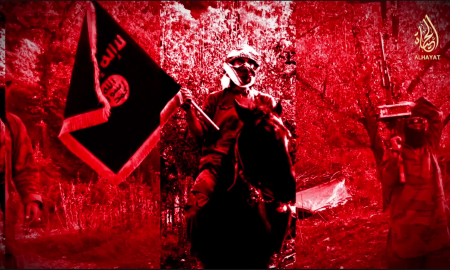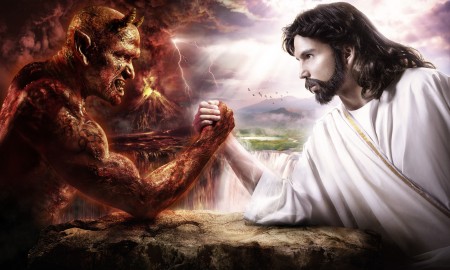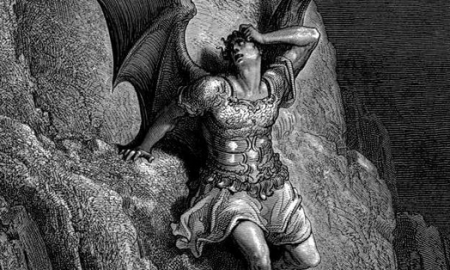The Qur’an it self many of is made by Satan as Allah said! but do not worry Allah will take it off????
From the great respected names in Islam Imam “Al-Tabari” said:
Satan Casts a False Revelation on
the Messenger of God’s Tongue
The Messenger of God was eager for the welfare of his people and wished to effect a reconciliation with them in whatever ways he could. It is said that he wanted to find a way to do this, and what happened was as follows.
Ibn Humayd – Salamah – Muhammad b. Ishaq – Yazid b. Ziyad al-Madani – Muhammad b. Ka’b al-Qurazi: When the Messenger of God saw how his tribe turned their backs on him and was grieved to see them shunning the message he had brought to them from God, he longed in his soul that something would come to him from God which would reconcile him with his tribe. With his love for his tribe and his eagerness for their welfare it would have delighted him if some of the difficulties which they made for him could have been smoothed out, and he debated with himself and fervently desired such an outcome. Then God revealed:
By the Star when it sets, your comrade does not err, nor is he deceived; nor does he speak out of (his own) desire…
and when he came to the words:
Have you thought upon al-Lat and al-‘Uzza and Manat, the third, the other?
Satan cast on his tongue, because of his inner debates and what he desired to bring to his people, the words:
These are the high-flying cranes; verily their intercession is accepted with approval.
When Quraysh heard this, they rejoiced and were happy and delighted at the way in which he spoke of their gods, and they listened to him, while the Muslims, having complete trust in their Prophet in respect of the messages which he brought from God, did not suspect him of error, illusion, or mistake. When he came to the prostration, having completed the surah, he prostrated himself and the Muslims did likewise, following their Prophet, trusting in the message which he had brought and following his example. Those polytheists of the Quraysh and others who were in the mosque likewise prostrated themselves because of the reference to their gods which they had heard, so that there was no one in the mosque, believer or unbeliever, who did not prostrate himself. The one exception was al-Walid b. Al-Mughirah, who was a very old man and could not prostrate himself; but he took a handful of soil from the valley in his hand and bowed over that. Then they all dispersed from the mosque. The Quraysh left delighted by the mention of their gods which they had heard, saying, “Muhammad has mentioned our gods in the most favorable way possible, stating in his recitation that they are the high flying cranes and that their intercession is received with approval.”
The news of the prostration reached those of the Messenger of God’s companions who were in Abyssinia and people said, “The Quraysh have accepted Islam.” Some rose up to return, while others remained behind. Then Gabriel came to the Messenger of God and said, “Muhammad, what have you done? You have recited to the people that which I did not bring to you from God, and you have said that which was not said to you.” Then the Messenger of God was much grieved and feared God greatly, but God sent down a revelation to him, for He was merciful to him, consoling him and making the matter light for him, informing him that there had never been a prophet or a messenger before him who desired as he desired and wished as he wished but that Satan had cast words into his recitation, as he had cast words on Muhammad’s tongue. Then God cancelled what Satan had thus cast, and established his verses by telling him that he was like other prophets and messengers, and revealed:
Never did we send a messenger or a prophet before you but that when he recited (the Message) Satan cast words into his recitation (umniyyah). God abrogates what Satan casts. Then God established his verses. God is knower, wise.
Thus God removed the sorrow from his Messenger, reassured him about that which he had feared and cancelled the words which Satan had cast on his tongue, that their gods were the high flying cranes whose intercession was accepted with approval. He now revealed, following the mention of “al-Lat, al-‘Uzza and Manat, the third, the other,” the words:
Are yours the males and his the females? That indeed were an unfair division! They are but names which you have named, you and your fathers.
to the words:
to whom he wills and accepts.
This means, how can the intercession of their gods avail with God?
When Muhammad brought a revelation from God canceling what Satan had cast on the tongue of His Prophet, the Quraysh said, “Muhammad has repented of what he said concerning the position of your gods with God, and has altered it and brought something else.” Those two phrases which Satan had cast on the tongue of the Messenger of God were in the mouth of every polytheists, and they became even more ill-disposed and more violent in their persecution of those of them who had accepted Islam and followed the messenger of God.
Those of the Companions of the Messenger of God who had left Abyssinia upon hearing that Quraysh had accepted Islam by prostrating themselves with the Messenger of God now approached. When they were near Mecca, they heard that the report that the people of Mecca had accepted Islam was false. Not one of them entered Mecca without obtaining protection or entering secretly. Among those who came to Mecca and remained there until they emigrated to al-Madinah and were present with the Prophet at Badr, were, from the Banu Abd Shams b. Abd Manaf b. Qusayy, Uthman b. ‘Affan b. Abi al-‘As b. Umayyah, accompanied by his wife Ruqayyah the daughter of the Messenger of God; Abu Hudhayfah b. ‘Utbah b. Rabi‘ah b. Abd Shams, accompanied by his wife Sahlah bt. Suhayl; together with a number of others numbering thirty three men.
Al-Qasim b. Al-Hasan – al Husayn b. Daud – Hajja – Abu Ma‘shar – Muhammad b. Ka‘b al-Qurazi and Muhammad b. Qays: The Messenger of God was sitting in a large gathering of Quraysh, wishing that day that no revelation would come to him from God which could cause them to turn away from him. Then God revealed:
By the Star when it sets, your comrade does not err, nor is he deceived…
and the Messenger of God recited it until he came to:
Have you thought upon al-Lat and al-Uzza and Manat, the third, the other?
when Satan cast on his tongue two phrases:
These are the high-flying cranes; verily their intercession is to be desired.
He uttered them and went on to complete the surah. When he prostrated himself at the end of the surah, the whole company prostrated themselves with him. Al-Walid b. al-Mughirah raised some dust to his forehead and bowed over that, since he was a very old man and could not prostrate himself. They were satisfied with what Muhammad had uttered and said, “We recognize that it is God who gives life and death, who creates and who provides sustenance, but if these gods of ours intercede for us with him, and if you give them a share, we are with you.”
That evening Gabriel came to him and reviewed the surah with him, and when he reached the two phrases which Satan had cast upon his tongue he said, “I did not bring you these two.” Then the Messenger of God said, “I have fabricated things against God and have imputed to him words which He has not spoken.” Then God revealed to him:
And they indeed strove hard to beguile you away from what we have revealed to you, that you should invent other than it against us…
to the words:
and then you would have found no helper against us.
He remained grief stricken and anxious until the revelation of the verse:
Never did we send a messenger or a prophet before you… to the words… God is knower, wise.
When those who had emigrated to Abyssinia heard that all the people of Mecca had accepted Islam, they returned to their clans, saying, “They are more dear to us”; but they found that the people had reversed their decision when God cancelled what Satan had cast upon the Messenger of God’s tongue. (The History of al-Tabari, translated and annotated by W. Montgomery Watt and M.V. McDonald [State University of New York Press (SUNY), Albany 1988], Volume 6, pp. 107-112)
عن ابن عباس رضي الله عنه من طريق آخر فيما أخرجه الضياء في المختارة (10/234) : ( أخبرنا أبو القاسم بن أحمد بن أبي القاسم الخباز أن أبا الخير محمد بن رجاء بن ابراهيم أخبرهم ابنا أحمد بن عبد الرحمن ابنا أحمد بن موسى بن مردويه حدثني ابراهيم بن محمد حدثني أبو بكر محمد بن علي المقرىء البغدادي ثنا جعفر بن محمد الطيالسي ثنا ابراهيم بن محمد بن عرعرة ثنا أبو عاصم النبيل ثنا عثمان بن الأسود عن سعيد بن جبير عن ابن عباس أن رسول الله صلى الله عليه وسلم قرأ أفرأيتم اللات والعزى ومناة الثالثة الأخرى تلك الغرانيق العلى و شفاعتهن ترتجا ففرح المشركون بذلك وقالوا قد ذكر آلهتنا فجاءه جبريل فقال اقرأ علي ما جئتك به قال فقرأ أفرأيتم اللات والعزى ومناة الثالثة الأخرى تلك الغرانيق العلى وشفاعتهن ترتجا فقال ما أتيتك بهذا هذا عن الشيطان أو قال هذا من الشيطان لم آتك بها فأنزل الله وما أرسلنا من قبلك من رسول ولا نبي إلا إذا تمنى ألقى الشيطان في أمنيته

And We did not send before you any messenger or prophet except that when he spoke [or recited], Satan threw into it [some misunderstanding]. But Allah abolishes that which Satan throws in; then Allah makes precise His verses. And Allah is Knowing and Wise.
Tafsir Ibn Kathir; http://www.qtafsir.com/index.php?option=com_content&task=view&id=2494&Itemid=77
How the Shaytan threw some Falsehood into the Words of the Messengers, and how Allah abolished!
At this point many of the scholars of Tafsir mentioned the story of the Gharaniq and how many of those who had migrated to Ethiopia came back when they thought that the idolators of the Quraysh had become Muslims, but these reports all come through Mursal chains of narration and I do not think that any of them may be regarded as Sahih. And Allah knows best. Al-Bukhari said, “Ibn `Abbas said,
﴿فِى أُمْنِيَّتِهِ﴾
(in his recitation (of the revelation).) “When he spoke, the Shaytan threw (some falsehood) into his speech, but Allah abolished that which the Shaytan threw in.”
﴿ثُمَّ يُحْكِمُ اللَّهُ ءَايَـتِهِ﴾
(Then Allah establishes His revelations.) `Ali bin Abi Talhah reported that Ibn `Abbas said,
﴿إِذَا تَمَنَّى أَلْقَى الشَّيْطَـنُ فِى أُمْنِيَّتِهِ﴾
(when he did recite (the revelation), Shaytan threw (some falsehood) in it) “When he spoke, the Shaytan threw (some falsehood) into his speech.” Mujahid said:
﴿إِذَا تُمْنَى﴾
(when he did recite) “When he spoke.” It was said that it refers to his recitation, whereas,
﴿إِلاَّ أَمَانِىَّ﴾
(but they trust upon Amani) means they speak but they do not write. Al-Baghawi and the majority of the scholars of Tafsir said:
﴿تَمَنَّى﴾
(he did recite) “Reciting the Book of Allah.”
﴿أَلْقَى الشَّيْطَـنُ فِى أُمْنِيَّتِهِ﴾
(Shaytan threw (some falsehood) in it) “In his recitation.” Ad-Dahhak said:
﴿إِذَا تُمْنَى﴾
(when he did recite) “When he recited.” Ibn Jarir said, “This comment is more akin to interpretation.”
﴿فَيَنسَخُ اللَّهُ مَا يُلْقِى الشَّيْطَـنُ﴾
(But Yansakh Allah that which Shaytan throws in.) The meaning of the word Naskh in Arabic is to remove or lift away. `Ali bin Abi Talhah reported that Ibn `Abbas said, “This means, Allah cancels out that which the Shaytan throws in.”
﴿وَاللَّهُ عَلِيمٌ﴾
(And Allah is All-Knower,) means, He knows all matters and events that will happen, and nothing whatsoever is hidden from Him.
﴿حَكِيمٌ﴾
(All-Wise.) means, in His decree, creation and command, He has perfect wisdom and absolute proof, hence He says:
﴿لِّيَجْعَلَ مَا يُلْقِى الشَّيْطَـنُ فِتْنَةً لِّلَّذِينَ فِى قُلُوبِهِم مَّرَضٌ﴾
(That He (Allah) may make what is thrown in by Shaytan a trial for those in whose hearts is a disease) meaning, doubt, Shirk, disbelief and hypocrisy. Ibn Jurayj said:
﴿الَّذِينَ فِى قُلُوبِهِمْ مَّرَضٌ﴾
(those in whose hearts is a disease) “The hypocrites, and
﴿وَالْقَاسِيَةِ قُلُوبُهُمْ﴾
(and whose hearts are hardened.) means the idolators.”
﴿وَإِنَّ الظَّـلِمِينَ لَفِى شِقَاقٍ بَعِيدٍ﴾
(And certainly, the wrongdoers are in an opposition far-off.) means, far away in misguidance, resistance and stubbornness, i.e., far from the truth and the correct way.
﴿وَلِيَعْلَمَ الَّذِينَ أُوتُواْ الْعِلْمَ أَنَّهُ الْحَقُّ مِن رَّبِّكَ فَيُؤْمِنُواْ بِهِ﴾
(And that those who have been given knowledge may know that it is the truth from your Lord, so that they may believe therein,) means, `so that those who have been given beneficial knowledge with which they may differentiate between truth and falsehood, those who believe in Allah and His Messenger, may know that what We have revealed to you is the truth from your Lord, Who has revealed it by His knowledge and under His protection, and He will guard it from being mixed with anything else.’ Indeed, it is the Wise Book which,
﴿لاَّ يَأْتِيهِ الْبَـطِلُ مِن بَيْنِ يَدَيْهِ وَلاَ مِنْ خَلْفِهِ تَنزِيلٌ مِّنْ حَكِيمٍ حَمِيدٍ ﴾
(Falsehood cannot come to it from before it or behind it, (it is) sent down by the All-Wise, Worthy of all praise (Allah).) ﴿41:42﴾
﴿فَيُؤْمِنُواْ بِهِ﴾
(so that they may believe therein,) means, that they may believe that it is true and act upon it.
﴿فَتُخْبِتَ لَهُ قُلُوبُهُمْ﴾
Allah copying ‘Umar ib Al-Khatab words and making it Qur’an as ‘umar said ?
Narrated `Umar (bin Al-Khattab):
My Lord agreed with me in three things: -1. I said, “O Allah’s Messenger (ﷺ), I wish we took the station of Abraham as our praying place (for some of our prayers). So came the Divine Inspiration: And take you (people) the station of Abraham as a place of prayer (for some of your prayers e.g. two rak`at of Tawaf of Ka`ba)”. (2.125) -2. And as regards the (verse of) the veiling of the women, I said, ‘O Allah’s Messenger (ﷺ)! I wish you ordered your wives to cover themselves from the men because good and bad ones talk to them.’ So the verse of the veiling of the women was revealed. -3. Once the wives of the Prophet (ﷺ) made a united front against the Prophet (ﷺ) and I said to them, ‘It may be if he (the Prophet) divorced you, (all) that his Lord (Allah) will give him instead of you wives better than you.’ So this verse (the same as I had said) was revealed.” (66.5).
حَدَّثَنَا عَمْرُو بْنُ عَوْنٍ، قَالَ حَدَّثَنَا هُشَيْمٌ، عَنْ حُمَيْدٍ، عَنْ أَنَسٍ، قَالَ قَالَ عُمَرُ وَافَقْتُ رَبِّي فِي ثَلاَثٍ، فَقُلْتُ يَا رَسُولَ اللَّهِ لَوِ اتَّخَذْنَا مِنْ مَقَامِ إِبْرَاهِيمَ مُصَلًّى فَنَزَلَتْ {وَاتَّخِذُوا مِنْ مَقَامِ إِبْرَاهِيمَ مُصَلًّى} وَآيَةُ الْحِجَابِ قُلْتُ يَا رَسُولَ اللَّهِ، لَوْ أَمَرْتَ نِسَاءَكَ أَنْ يَحْتَجِبْنَ، فَإِنَّهُ يُكَلِّمُهُنَّ الْبَرُّ وَالْفَاجِرُ. فَنَزَلَتْ آيَةُ الْحِجَابِ، وَاجْتَمَعَ نِسَاءُ النَّبِيِّ صلى الله عليه وسلم فِي الْغَيْرَةِ عَلَيْهِ فَقُلْتُ لَهُنَّ عَسَى رَبُّهُ إِنْ طَلَّقَكُنَّ أَنْ يُبَدِّلَهُ أَزْوَاجًا خَيْرًا مِنْكُنَّ. فَنَزَلَتْ هَذِهِ الآيَةُ.
| Reference | : Sahih al-Bukhari 402 |
| In-book reference | : Book 8, Hadith 53 |
| USC-MSA web (English) reference | : Vol. 1, Book 8, Hadith 395 |
| http://sunnah.com/bukhari/8/53 |



